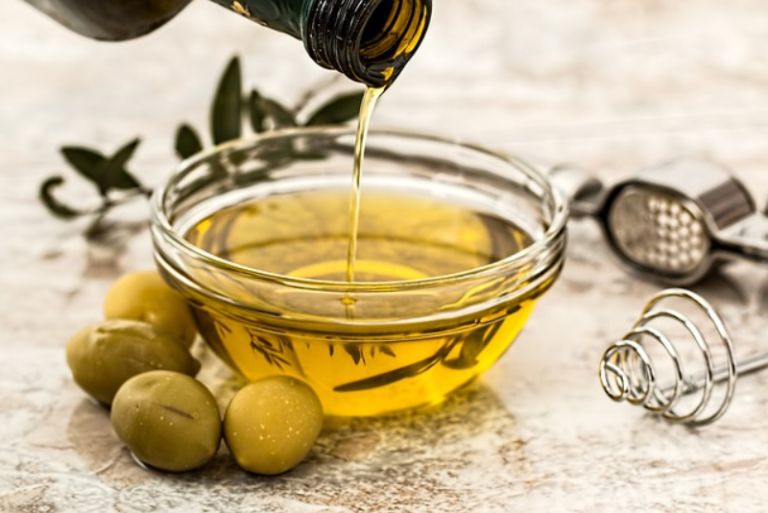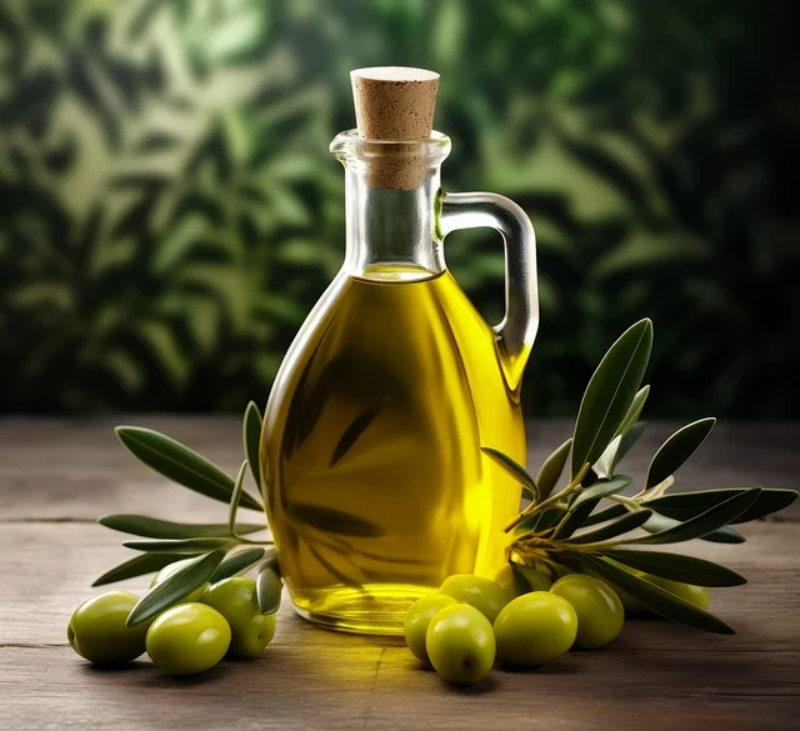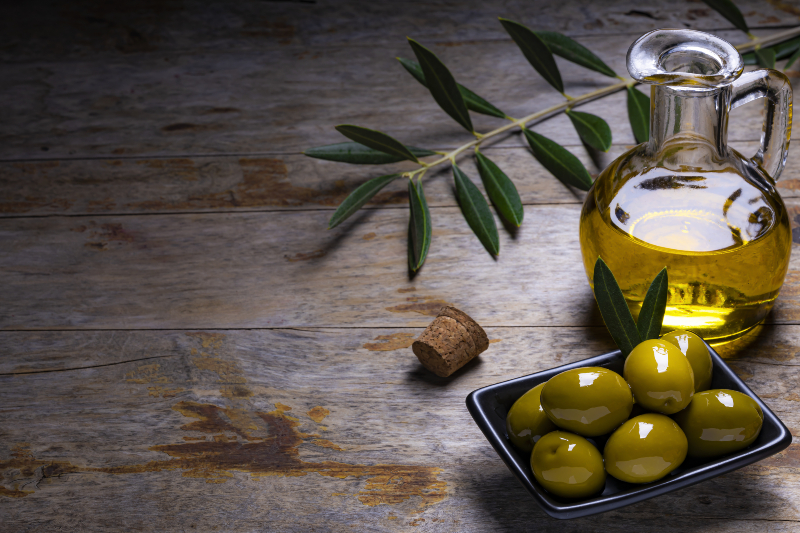Olive oil: From peak to plunge in prices

Πηγή Φωτογραφίας: Pixabay//Olive oil: From peak to plunge in prices
The trajectory towards the limit down that olive oil has been charting internationally and in Greece lately is clear, even with a cursory glance at price fluctuations. Indicatively, according to official data published by the European Commission’s Directorate-General for Agriculture and Regional Development, based on the most recent entry on 2 December, the wholesale price of extra virgin olive oil in the Greek market is 541.25 euros /100 kg.
This means that the current selling price of olive oil in our country, on average, is making a small correction, as it has even fallen below the reference price of 5 euros per kilo (although the usual reference unit is the liter). On November 18, the EU was recording 4.92 euros per kilo, while about a month ago (21/10) it was at 6.85 euros per kilo, or 28.1% more expensive. At the beginning of this year (8/1) Greek olive oil was at the limit up, very close to 9 euros/kilo. Therefore, in the last 12 months, the price of olive oil in Greece has fallen by 39%-45%.

Of course, the precipitous drop in costs could not have been more comforting to consumers. The Greeks’ popular oil, an essential ingredient of the daily diet for millennia, one might say, has inevitably been relegated to the category of luxury goods – and especially the unaffordable ones. The return to rationality translates into today’s retail prices of 8 to 11 euros minimum or 14-17 euros maximum, depending on the supermarket chain.
Thus, one could say that olive oil currently ranges between 11-14 euros/liter in the Greek retail market, speaking always of the branded, cheese-flavored products – whereas at the peak of their explosive rise, the lowest price was 16-17 euros – and not of premium, special varieties, those in luxury packaging, etc.
Retail prices
The high wholesale price is reflected sooner or later on supermarket shelves. There, during the period of the price crisis, olive oil was increasingly justifying the hyperbolic description of “liquid gold” recently used by the Times of London.
Quite apt, admittedly, since the “oil stock market” is little different from the financial markets in name, the fluctuations, the trends that occasionally prevail and push indices either into rallies or uncontrollable downhill, the crises – artificial and otherwise – along with all the special factors on which the abundance or scarcity of an agricultural product depends.
In any case, the path towards price decalcification, as it has recently taken shape in the international olive oil market, is not only auspicious, but it seems that it will prove to be long-lasting. Expert analysts predict that in the near future, olive oil will return to prices close to those of 2021, when its uncontrolled take-off began, reaching an almost unrealistic increase for a mass-consumption product within four years.
It is also important to note that the retreat of olive oil prices is taking with it a large number of products, mainly food, and even services. After all, as Secretary General of Commerce, Sotiris Anagnostopoulos pointed out last April at the Delphi Economic Forum, almost half of food inflation (2.5% of 5.3%) in Greece is due to olive oil.
Focusing on Spain, a country that accounts for almost half of the world’s olive oil production, in August 2020 the wholesale price was €1.85/kg. In January this year, in direct proportion to Greece, extra virgin olive oil had reached a ceiling of €8.7/kilo. This difference corresponds to a percentage increase of 370.3%.

The speculation
The recent initiative of the European Union to set up a specialised institution, a Market Observatory for Olive Oil and Table Oils, confirms in practice the need for systematic control in a sector that is of great interest not only for the nutrition of a large part of humanity, but also because of the large scope for massive speculative games.
Olive oil, as a consumer product that follows the laws of supply and demand, is more than that, it acts as an indicator of the current state of affairs in the economy, in transnational trade relations, even in politics and certainly in society. In fact, the natural factor, on which olive oil production depends primarily and entirely, can serve as the ideal pretext for would-be oil prospectors to justify the limited availability of the product and, consequently, the increase in demand and prices.
In any case, olive oil is neither oil nor gold, hence its long-term storage, especially in quantities large enough to create artificial shortages, carries a very high risk of destroying the product itself. Nevertheless, those who see olive oil as another kind of gambling, as a financial investment, devise the appropriate tricks to maximise their profits.
The most common practice of distorting the true picture of the market is the commercial rebranding of oil produced in countries such as Tunisia, Turkey, and Greece. For example, it very often happens that Italian industries buy large quantities from Greek producers, in tanks or in bulk, at extremely low prices.
Then, the same product is packaged and marketed in a completely different category, under the label of authentic Italian olive oil, at a cost to the consumer of at least five times more than if he had bought it directly from the Greek producer or, at least, from the Greek market. These practices cause distortions on multiple levels, both in terms of product identification and value and in the functioning of the market.
However, as far as the domestic trend of obscenity and its curbing is concerned, the Ministry of Development has imposed an obligation on traders not to exceed the profit margin on olive oil that they had in 2021.
Taking this year as a benchmark, during which Spain produced 1,492,000 tonnes of olive oil. The following year (the annus horribilis of olive growing mainly in southwestern Europe due to the prolonged drought) Spanish production fell by less than half, to just 666,000 tonnes.
The situation improved somewhat in the 2023-2024 period when the Spanish saw their production rise to 851,000 tonnes, but the shortfall, some 1.5 million tonnes during the blighted two-year period, was inevitably too large to pass painlessly for the international market, which reacted as predicted, with excessive price increases, which reinforced the move away from olive oil by a very large proportion of the public.
It is estimated that about 40% of consumers have started using much cheaper seed oils (sunflower, maize, corn, seed oil, etc.), creating a trend that is very difficult to reverse. The fall in its price may tempt some people to return to a genuine olive oil of superior nutritional value, but many experts are pessimistic that the return will not be universal, even in the long term, even though the Mediterranean diet has been increasingly promoted worldwide in recent years as a model of a balance of flavours, healthy raw materials, combinations, and preparation methods.
The missed opportunity
The Greek paradox concerning olive oil lies in the fact that our country tends to coordinate with the rest of Europe only in the negative aspects, the disharmony between production and demand while leaving untapped opportunities for domestic producers, offered, unexpectedly, by some climatic whims.
A typical case of this kind was what happened in the olive oil market in the period 2022-2023, when Greece, by some mercy of nature, found itself in a better position compared to Spain, Portugal ,and Italy, where oil production was flattened by drought. Greek production suffered less, which would have been a great competitive advantage – if only it had been exploited as it should have been. But instead of Greece, it was Turkey that saw the opportunity in time and entered the market aggressively at the same time. The result was to take second place among the world’s largest oil-producing nations.
In stock market terms, the outlook for the oil market for the foreseeable future goes beyond the occasional correction. According to Miguel Angel Guzman, Sales Director of Deoleo, a giant in this sector, “We are optimistic as we expect the olive oil market to stabilize, with normality in prices gradually returning.
This is indicated by the progress of the harvest in Spain and the consequent increase in supply on the market. If weather conditions continue to be favorable and the amount of fruit harvested remains stable, the deceleration in producer prices will continue in December and January 2025. However, demand for olive oil will likely continue to fall, as a side effect of previous years, due to price pressures and the public’s shift to other types of oil.”
The point about consumers moving away from olive oil, as Mr. Guzman puts it, is anything but negligible. On the contrary, it is a factor that has a pivotal impact on the oil market. The opinion of economist Dimitra Alieos, an expert in the international olive oil trade, as expressed in an article published on the website of the Greek Scientific Society of Olive Oil Encyclopedists, states that “in the last two years we have lost 40% of olive oil sales.
These losses are unlikely to be recovered any time soon. Some consumers have become familiar with seed oils, while others have learned to make blends in their kitchens by mixing seed oil with olive oil, half and half. Since it’s not allowed in public, it’s allowed at home! It will take a lot of effort and patience to bring the market back.”
Vassilis Zambounis, commenting on the current situation within the Olive Oil and Table Olive Observatory, radiates the dilemmas of Greek producers, who seem to have adopted a wait-and-see attitude in recent months, believing, predicting or simply hoping that the fall in prices would be temporary and that there would soon be a recovery.
The result was that they abstained from the market, avoiding selling their stocks, against the international trend which is firmly oriented towards putting products on the market in the largest possible quantities. The caution of the Greeks does not seem to be working to their advantage, at least in the downward phase of the oil market. Which is not going to stop, possibly ever, holding surprises behind the label of olive oil, a product almost intertwined with man’s presence on planet Earth.
Source: pagenews.gr
Διαβάστε όλες τις τελευταίες Ειδήσεις από την Ελλάδα και τον Κόσμο































Το σχόλιο σας